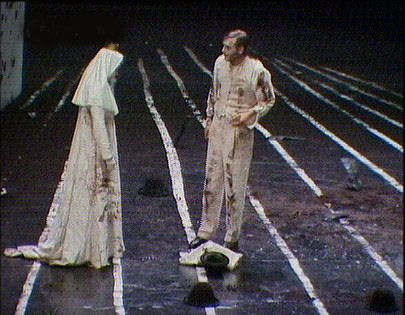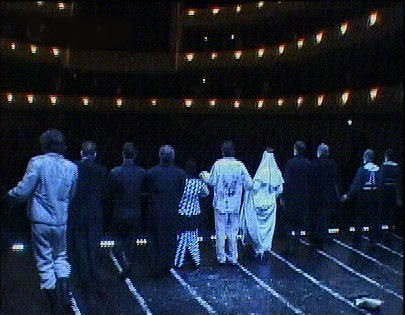Slurring, stuttering and the 'falling ending'

SLURRING - a lot of it in daily conversation
SLURRING IS - difficulty expressing certain sounds or words.
Words are clipped, or not fully pronounced or incompleted.
Endings of phrases or sentences not realised.
Sloppy enunciation in an actor - diagnosis needed
| CHECK if there is a mechanical cause in your actor - as poorly fitting dentures. |
| SLURRING is a BIG DANGER in radio acting. It has a number of causes. You have to work fast to diagnose the cause. |
| As DIRECTOR, you must support your actor. Do not let your actor lose confidence. But PRODUCT is the aim. |
| SLURRING - WHY? - Most of us slur in ordinary speech. Some individuals more than others. |
| Sometimes, younger people slur as part of their sub-culture. This is about 'locking out' adults from the language of the young, and about 'locking in' friends. |
| Watch out for the danger of the FALLING ENDING (BELOW) - the ending of a sentence is lost. |
Slurring as an actor is due to -
| NOT THINKING THROUGH THE MEANING OF EACH PHRASE |
| SOLUTION: Enable your actor to investigate in detail the meaning of each phrase. Perhaps, the actor could use other words to express the phrase so that the meaning comes through. Then use that understanding for the script. |
| Your actor must then unpack the character's thought process through the phrase. And then do the actor's job - translate that into the delivery of lines to the microphone. |
|
NOT CARRYING VOCAL ENERGY THROUGH TO THE END OF THE PHRASE OR SENTENCE |
| SOLUTION: Get control of breathing so that the energy continues to the ending. There may be just a mechanical reason. Tiredness? |
|
NOT CARRYING THROUGH THE PHRASING AND MEANING RIGHT THROUGH TO THE END OF THE SENTENCE |
| SOLUTION: Think through the meaning to the end. Find the justification for the ending. Invest the meaning with energy. Concentration needed by the actor. Find your justification for each moment |
| IS THERE A BIGGER PROBLEM? Is the scripted character 'boxed-in' overall? Is 'boxed-in' your DIRECTING CHOICE for this character? Do not choose a 'boxed-in' character. Does the SCRIPT need redrafting? DO NOT CHOOSE SCRIPTS THAT DE-SKILL THE ACTOR. |
| Stuttering in everyday speech is a loss of speech fluency . There are intermittent, involuntary interruptions in the flow of speech. |
| People who stutter know what they want to say. But they are momentarily unable to say it because of 'disfluencies' (interruptions in the flow of speech). |
| DO NOT include a radio drama character who stutters, with a lot of interruptions to speech. Your listeners will become fed up with this sort of script delivery. This advice is not intended to discriminate. But this type of specialist acting requires a professional actor. Stuttering is very rare in radio drama. It also causes difficulty for scene partners. Cues are slowed up. |

| INVESTIGATE WHAT THE 'FALLING ENDING IS IN REAL-LIFE SPEECH: Start looking for examples of the 'falling ending'. Listen to your friends. Listen out for that person who swallows the end of every sentence and even every phrase. You will find them! |
| Listen and observe from films, especially American films. |
| For example, in 'Skulls III', the female lead puts a falling ending into nearly everything she says. It's weird!! |
| It is a way of speaking in real-life talk. And especially in young people. This is sometimes a marker of being young. But NOT ON THE MICROPHONE! |
| Observe also the 'rising ending'. Each sentence ends on a rising musical note, whether question or statement or anything. This is a feature of Australian speech and of Estuary English in the UK. Does it serve the meaning of the script? Hardly. |
IS THE ACTOR PREPARED FOR THE GREEN LIGHT AND EACH TAKE?
TECHNIQUE: 'THE MOMENT BEFORE' THE CUE LIGHT COMES ON
| QUESTION FOR THE ACTOR: ARE YOU PHYSICALLY AND MENTALLY ENGAGED WITH THE ROLE? |
| Are you prepared for this green cue light? |
| What is your character doing thirty seconds before the cue? |
| This will help you stay focused and with an objective for your character at this point in the script. |
Advice - Your work as a radio drama director
|
|



